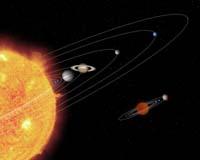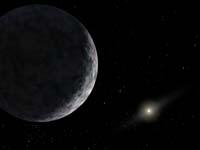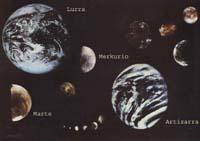Use the word planet carefully

In the school age the list of planets of our Solar System is learned by heart: From the closest to the Sun, Mercury, Mars, Earth, Venus, Jupiter, Saturn, Uranus, Neptune and Pluto. Nine in total.
Okay. But from the astronomical point of view there is a problem: these planets are very different from each other. Therefore, they are divided into two large groups according to their nature. The closest to the Sun are the terrestrial planets: Mercury, Mars, Earth and Venus. They are solid planets. The rest are gas giants: Jupiter, Saturn, Uranus and Neptune.
And Pluto? Pluto is something else. This is the last planet found, the furthest from the Sun, which sometimes has a more elliptical orbit than the rest. There are experts who believe it is not a planet. And this conviction has taken hold as other objects have been found near Pluto.
In addition, the debate has gained momentum this summer, as they have found an object greater than Pluto himself orbiting near Pluto: 2003 UB313. At the time of discovery it was said in the media that it was the “tenth planet” of our solar system, and one of the discoverers, Brown, is making a passionate defense for it.
Looking for a decision

The debate is there: If UB313 is accepted as a planet, it will have to be said that in our Solar System there are ten planets — and it is possible to find more planets later — but if it is not accepted, there will be eight planets, as Pluto will also have to be removed from the list.
As a culmination of the debate, a group of experts meets to define what a planet is and what is not. These experts are members of the International Astronomy Union (UAE). And, for now, the decision they have made is that the term planet should be used with a qualifier.
Of course, now you have to decide the qualifiers. The proposal of one of these experts is to use the term transneptune planet for UB313 and Pluto, and use the terms of terrestrial planets and gas giants used to date for the rest of planets. However, they clarify that the designation of the latter is not an obligation of this group but of the EAE.
Not so easy

The planets in our solar system are very different and it seems that the word planet should be better defined.
(Photo: NASA/JPL-Caltech/T. Pyle)
But not everyone agrees with this proposal, since saying that Pluto and UB313 are transneptunotarras refers to their location and it would be more appropriate to use a qualifier that responds to the characteristics of these objects. Dwarfs would then be frozen.
So the debate is like that. Another thing is that they decide what they decide, whether the street people will introduce new terms or whether they have to internalize them. You have to change textbooks, encyclopedias, dictionaries... but that's not the hardest thing. It will be much more difficult to imagine that in our solar system there are nine planets, eight or ten. And if instead of using the word planet you have to learn the qualifier corresponding to each one... It will take more or less.
Just in case, the term planet should be used cautiously.
Published in 7K.
Buletina
Bidali zure helbide elektronikoa eta jaso asteroko buletina zure sarrera-ontzian








